What Are Abstract Nouns And How Do You Use Them?
- What's An Abstract Noun?
- Abstract Vs. Concrete Nouns
- Get Help With Grammar Coach
You probably know that a noun is a word that refers to a person, place, thing, or idea—this is a grammar concept we learn pretty early on in school. And there are, of course, several different types of nouns that we use to refer to all of the things we experience during our lives: We eat food. We meet friends. We go to the store. These nouns refer to the people and physical objects that we interact with.
But what about the things that we can’t actually see or touch? Aren’t words like love , victory , and alliance nouns, too? Yes, they are, and there is a term you may not remember from your grade-school days that we use to refer to these things: the abstract noun.


What is an abstract noun?
An abstract noun is “a noun denoting something immaterial and abstract.” Another common way to think about abstract nouns is that they refer to things that you cannot experience with the five senses . You cannot see, smell, hear, taste, or touch abstract nouns. Abstract nouns refer to intangible things that don’t exist as physical objects.
For example, the word cat refers to a cute animal. You can see and touch a cat. The noun cat is not an abstract noun. On the other hand, the word luck refers to a complex idea about how likely it is that good or bad events are going to happen to someone. Luck doesn’t exist as a physical object; you can’t eat luck nor can you go to a store and buy luck. Luck is an abstract noun because it refers to an intangible concept rather than a physical object that we can experience with our senses.
What about those nouns that you can tangibly sense? Learn more about concrete nouns here.
Abstract noun examples
Unlike most other nouns, abstract nouns don’t refer to people or places. After all, people and places are real things that exist in our world. Even nouns that refer to fictional characters and places, such as Godzilla or Valhalla , are not, the reasoning goes, abstract nouns because these things would have a physical form if they were actually real.
So, all abstract nouns are “things.” Remember, though, that abstract nouns only refer to intangible things such as emotions, ideas, philosophies, and concepts. Let’s stop being abstract and look at some specific examples so we can get a better understanding of abstract nouns.
Even though we often say that we “feel” emotions, we don’t mean that literally. You “feel” emotions like happiness or anger as thoughts in your mind or activity in your brain and body. You can’t hold happiness in your hand or eat a plate of sadness. You can see people or animals expressing these emotions through actions, but emotions are not tangible objects. So, we refer to them with abstract nouns.
- Examples: happiness, sadness, anger, surprise, disgust, joy, fear, anxiety, hope
Ideas, concepts and beliefs
Besides emotions, abstract nouns are also used to refer to other concepts and ideas. These kinds of abstract nouns give names to complex topics and give us a glimpse into a big part of what makes us human—our big, wrinkly brains! While most abstract nouns are common nouns, meaning that they refer to general ideas, they can also be proper nouns, such as Christianity.
- Examples: government, dedication, cruelty, justice, Christianity, Islam, Cubism
List of abstract nouns
Abstract nouns can be pretty tough to understand, so let’s look at a bunch more:
- religion, science, experimentation, research, magnetism, creativity, invisibility, kindness, greed, laziness, effort, speed, concentration, confusion, dizziness, time, situation, existence, death, anarchy, law, democracy, relief, opportunity, technology, discovery, hopelessness, defeat, friendship, patience, decay, holiness, youth, childhood, Stoicism, Marxism
The difference between abstract & concrete nouns
Getting a grasp on what abstract nouns are, exactly, can be tough. While abstract nouns refer to intangible things without a physical form, all of the people, places, and things that do actually have a physical form are referred to by a type of noun: a concrete noun. Unlike abstract nouns, concrete nouns can be experienced with the five senses: they can take a material form rather than an image, say, in your mind’s eye of catness. You can see a tree . You can eat a pineapple. You can hear an engine. You can smell socks. You can touch a lamp.
So, your five senses can help you distinguish between abstract and concrete nouns. Remember, words for fictional people, places, and things are considered to be concrete nouns even if they don’t actually exist in our world. You may not be able to smell a zombie in everyday life, but you would be able to if it were real—just remember to run away if you ever saw one!
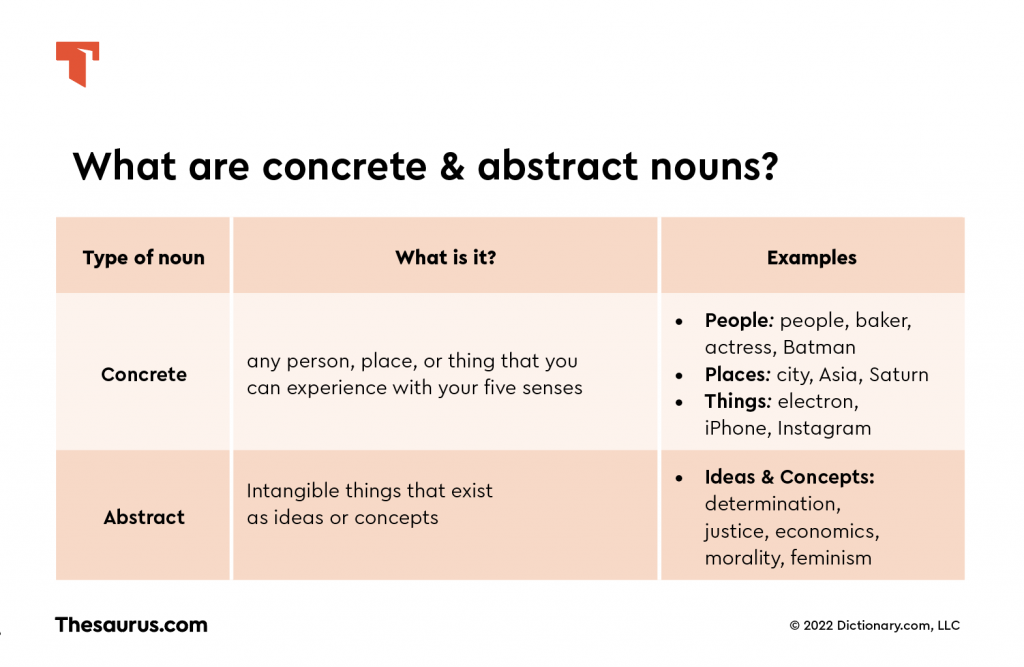
Let’s put your noun knowledge to the test with some example sentences. Read each sentence and see if you can figure out if each italicized noun is an abstract noun or a concrete noun.
- Billionaire Jeff Bezos is famous for his wealth.
- Next week, we are going on vacation to Belgium.
- When I grow up, I want to be a superhero.
- They said he was possessed by a ghost.
- The robot had many impressive abilities.
- Her blindness didn’t stop her from being successful.
- I was attacked by a swarm of bees.
- She sells seashells by the seashore.
- We heard shouting from next door.
- The girl just wants attention from her parents.
Good grammar: not an abstract concept
We’ve got a noun for you: genius! And that’s what you’ll be when you check your writing on Thesaurus.com’s Grammar Coach™ . This writing tool uses machine learning technology uniquely designed to catch grammar and spelling errors. Its Synonym Swap will find the best nouns, adjectives, and more to help say what you really mean, guiding you toward clearer, stronger, writing.
Whether you’re writing about a person, place, or thing, perfect grammar has never been easier!
Answers: 1. Abstract 2. Concrete 3. Concrete 4. Concrete 5. Abstract 6. Abstract 7. Concrete 8. Concrete 9. Concrete 10. Abstract
Make Your Writing Shine!
- By clicking "Sign Up", you are accepting Dictionary.com Terms & Conditions and Privacy policies.
- Name This field is for validation purposes and should be left unchanged.
No judgment here if you don't know the difference between "judgment" and "judgement." Let's read here!

Ways To Say
Synonym of the day

Abstract Noun
What is an abstract noun.
- consideration, parenthood, belief, anger
Table of Contents
More Examples of Abstract Nouns
Find the abstract noun test, abstract nouns vs concrete nouns, list of abstract nouns, why abstract nouns are important, video lesson.

Abstract or Concrete? It Could Be Ambiguous.
- anger, anxiety, beauty, beliefs, bravery, brilliance, chaos, charity, childhood, comfort, communication, compassion, courage, culture, curiosity, deceit, dedication, democracy, determination, energy, failure, faith, fear, freedom, friendship, generosity, gossip, happiness, hate, honesty, hope, imagination, information, integrity, intelligence, joy, justice, kindness, knowledge, liberty, life, love, loyalty, luxury, misery, motivation, opportunity, pain, patience, peace, perseverance, pleasure, pride, relaxation, sacrifice, satisfaction, skill, strength, success, sympathy, talent, thought, trust, truth, warmth, wisdom
- ...and my bicycle never leaned against the garage as it does today, all the dark blue speed drained out of it. (from "On Turning Ten" by American Poet Laureate Billy Collins
- If writing a poem, consider expressing abstract ideas using concrete nouns.
Are you a visual learner? Do you prefer video to text? Here is a list of all our grammar videos .

This page was written by Craig Shrives .
You might also like...
Help us improve....

Was something wrong with this page?

Use #gm to find us quicker .

Create a QR code for this, or any, page.
mailing list
grammar forum
teachers' zone
find the nouns in 8 classic texts
download 1-page PDFs about nouns
watch a slide show on nouns
confirmatory test
This test is printable and sendable
expand to full page
show as slides
download as .doc
print as handout
send as homework
display QR code
Academia.edu no longer supports Internet Explorer.
To browse Academia.edu and the wider internet faster and more securely, please take a few seconds to upgrade your browser .
Enter the email address you signed up with and we'll email you a reset link.
- We're Hiring!
- Help Center

Download Free PDF
Abstract Nouns

T h e A b s t r a c t N o u n Recognize an abstract noun when you see one.
Related papers
Procedia - Social and Behavioral Sciences, 2014
Despite centuries of studying abstract nouns, linguists have so far failed to come to unanimous understanding of this category but agree on the ambiguity of the term and the concept itself. The main issue every researcher faces is the lack of clearly defined term 'abstract'. Moreover, there have been suggested numerous and diverse approaches to distinguishing between abstract and concrete nouns ranging from selected formal grammar criteria to semantic and extra linguistic parameters. This paper aims at considering the existing methods of determining abstract words with an attempt to understand which are better applicable. Besides, the article covers the progress in this research covering the period from Ancient Greece to present day researchers in various fields of knowledge, including but not limited to linguistics, clinical psychology, and philosophy, as all these areas propose their own outlook on the issue of the nature of abstractions and their distinction from concrete words.
Brain Research, 2009
Journal of Verbal Learning and Verbal Behavior
Four types of nouns were used as stimuli in a paired-associate learning experiment, lowimagery nouns that correspond to simple lexical entries (e.g, soul) and low-imagery nouns that may be derived from more basic lexical entries (e.g., explanation); high-imagery nouns that correspond to simple lexical entries (e.g., comrade), and high-imagery nouns that are derived lexlcally (e.g., speaker). Both low imagery and lexical complexity significantly retarded paired-associate learning. The frequency with which words are used was shown to be important, in that some high-frequency words that may be derived lexically were nevertheless treated like simple lexical entries. It was argued that lex~cal derivations are interesting psychological processes which must not be confused with abstractness.
Poznan Studies in Contemporary Linguistics, 2008
The paper presents a study aiming at comparing the usefulness of the definitions of abstract nouns in a pedagogical dictionary (Oxford Advanced Learners Dictionary, OALD7) and a nativespeaker dictionary of English (The ew Oxford Dictionary of English, NODE). It starts with a brief description of the subclass of abstract nouns which is conceived of as a prototypicallystructured category composed of members exhibiting different degrees of resemblance to the prototype. Moreover, the most prototypical members of the subclass of abstract nouns are proposed and a comparison of the definitions of abstract nouns from the two dictionaries is made. The paper then reports on the empirical study which investigated the usefulness of the definitions of abstract nouns from the two dictionaries on a group of 60 dictionary users whose level of English oscillated between upper intermediate and advanced. Finally, the results of the study are discussed and an attempt is made to set out the possible reasons for the final outcome of the study.
Frontiers in Human Neuroscience, 2013
Two views on the semantics of concrete words are that their core mental representations are feature-based or are reconstructions of sensory experience. We argue that neither of these approaches is capable of representing the semantics of abstract words, which involve the representation of possibly hypothetical physical and mental states, the binding of entities within a structure, and the possible use of embedding (or recursion) in such structures. Brain based evidence in the form of dissociations between deficits related to concrete and abstract semantics corroborates the hypothesis. Neuroimaging evidence suggests that left lateral inferior frontal cortex supports those processes responsible for the representation of abstract words.
Awareness is a two-place determinable relation some determinates of which are seeing, feeling, hearing, etc. 2 If you see a fire truck, or if you hear a fire truck, then you are aware of that fire truck-i.e., you stand in the awareness relation to the fire truck you see, or hear, and do so because you see it or hear it. Abstract objects are items, such as universals, propositions, numbers, functions, and sets, which contrast with concrete objects, such as solids, liquids, gases, particles, and organisms. It is a nice question what defines the category of abstract objects. 3 Typical abstract objects lack spatiotemporal locations and do not stand in causal relations. Saying this much should suffice for my purposes here.
Abstract Eight abstract concepts were submitted to a procedure designed to test the logical nature of their definition. The hypothesis that they would show a polymorphous prototype structure similar to that found for concrete categories (Hampton, 1979; Rosch & Mervis, 1975) was confirmed for five of the concepts. Reasons for the lack of fit of the prototype model to the remaining concepts and implications for the generality of existing theories of semantic memory are discussed.
Review of Philosophy and Psychology, 2021
In psycholinguistics, concepts are considered abstract if they do not apply to physical objects that we can touch, see, feel, hear, smell or taste. Psychologists usually distinguish concrete from abstract concepts by means of so-called concreteness ratings. In concreteness rating studies, laypeople are asked to rate the concreteness of words based on the above criterion. The wide use of concreteness ratings motivates an assessment of them. I point out two problems: First, most current concreteness ratings test the intuited concreteness of word forms as opposed to concepts. This ignores the ubiquitous phenomenon of lexical ambiguity. Second, the criterion of abstract concepts that the instruction texts of rating studies rely on does not capture the notion that psychologists working on abstract concepts are normally interested in, i.e., concepts that could reasonably be sensorimotor representations. For many concepts that pick out physical objects, this is not reasonable. In this pape...
Philosophical Transactions of the Royal Society B, 2022
Despite the recent upsurge in research on abstract concepts, there remain puzzles at the foundation of their empirical study. These are most evident when we consider what is required to assess a person's abstract conceptual abilities without using language as a prompt or requiring it as a response-as in classic non-verbal categorization tasks, which are standardly considered tests of conceptual understanding. After distinguishing two divergent strands in the most common conception of what it is for a concept to be abstract, we argue that neither reliably captures the kind of abstraction required to successfully categorize in non-verbal tasks. We then present a new conception of concept abstractness-termed Trial Concreteness-that is keyed to individual categorization trials. It has advantages in capturing the context-relativity of the degree of abstraction required for the application of a concept and fittingly correlates with participant success in recent experiments.
IJHSSI, 2024
For about three decades, psychologists have postulated the existence of human memorysystems. Many speculations concerning memory have come up since Hebb (1949), Miller(1956), and Broadbent (1958). Between 1950s and 1960s short-term memory (STM)drew the attention of many scientists in different fields. Investigating short-term memoryhas become very popular globally especially in psycholinguistic, cognitive, andneurolinguistic domains. This paper aimed to explore the memorizing of concrete andabstract nouns to find out if nouns referring to tangible objects are easier to memorizethan those referring to intangible ones. To answer the research questions, an experimentalstudy was conducted on a group of male participants who underwent three variousdifferent studies in Riyadh city, Saudi Arabia. This experimental study used analyticmethod and statistical analysis. The results proved that concrete nouns are greater innumber in shortterm memory than abstract nouns. Moreover, processing concrete nouns iseasier than abstract nouns which proves also the effectiveness of concrete nouns. This result may contribute greatly in designing English curriculum for learners, enhancing processing linguistic concepts in short-term memory and developing the lexicon in memory.
Ancient History Bulletin, 2023
MPRA Paper, 2016
Chung Yang Yen Chiu Yuan Li Shih Yu Yen Yen Chiu So Chi K'an /Bulletin of the Institute of History and Philology Academia Sinica, 2022
hps.elte.hu
REVISTA OTRA ESCENA, 2008
Urdimento - Revista de Estudos em Artes Cênicas. Florianópolis, v. 2, n. 51., 2024
Vitam. Revista de Investigación en Humanidades, 2023
TURKISH JOURNAL OF GASTROENTEROLOGY, 2008
Journal of Research on Adolescence, 2013
Revista Medicina Cut�nea Ibero-Latino-Americana, 2021
MEDICINA ( …, 1999
Journal of the Royal Society Interface, 2013
Iranian Journal of Neurology, 2019
- We're Hiring!
- Help Center
- Find new research papers in:
- Health Sciences
- Earth Sciences
- Cognitive Science
- Mathematics
- Computer Science
- Academia ©2024
Understanding an Abstract Noun (Definition, Examples, Word List)

What is an abstract noun? How is it different from a common noun ? What are words that represent an abstract noun? These are all great questions that you probably have . Abstract nouns can get confusing when comparing them to regular common nouns or proper nouns. This comprehensive guide will break down the abstract noun, its use , and the functions that grammatically govern it.
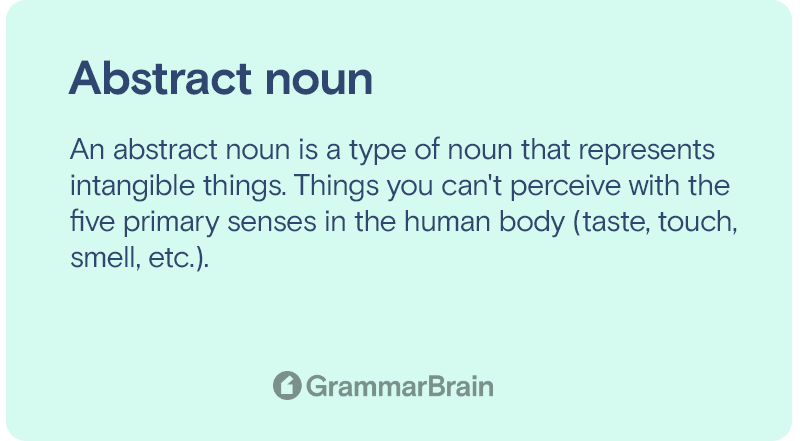
What is an abstract noun?
An abstract noun is a type of noun that represents intangible things. Things you can’t perceive with the five primary senses in the human body (taste, touch, smell, etc.).

Abstract noun definition
As the name suggests, an abstract noun is a noun type. It refers to an intangible idea (one that you cannot fathom using your five senses). Such intangible concepts could include emotions, qualities, ideas, etc.
All nouns that do not have a tangible or physical object to refer to fall under the bracket of abstract nouns . Abstract nouns are widely used in English proverbs.
Some common examples include health, wealth, parenthood, anger, courage, and more.
Abstract noun compared to other nouns
Nouns are an essential part of speech. They are instrumental in naming places, people, objects, animals, and intangible ideas.
You may have noticed that whenever you write a sentence , you are using at least one noun in it.
Nouns can get used differently in different sentence formations. Their functions can vary. Here are the main types of nouns you could use in a complete sentence:
Proper Nouns
Proper nouns are naming agents for places, people, or things. They usually start with a capital letter.
For example:
- My name is Lisa. (Lisa is the proper noun )
- John lives in Finland. (Finland is the proper noun)
- Jazz is a famous book. (Jazz is the proper noun)
Common Nouns
Nouns that refer to generic things are referred to as common nouns .
- I bought a new book yesterday. (Book is the common noun)
- There is a pigeon on the windowsill. (Pigeon is the common noun)
- Rob bought a blue car. (Car is the common noun)
Countable Nouns
Nouns that can be measured or counted are called countable nouns .
- I take two spoons of sugar in my tea. (“Two” is the countable noun )
- She bought a dozen bananas at the market. (“A dozen” is the countable noun)
Uncountable Nouns
Nouns that cannot be measured or counted are called uncountable nouns.
- I have plenty of homework. (Plenty is the uncountable noun)
- Is that enough milk in your coffee? (Enough is the uncountable noun)
Collective Nouns
Collective nouns depict a group of objects, people, animals, and more.
- A flock of sheep
- A pile of books
- A school of fish
- A bevy of women
Concrete Nouns
Also referred to as material nouns, concrete nouns refer to things that have a physical presence and can be perceived using the five senses.
Abstract Nouns
Any noun that is intangible or which cannot be perceived using the five senses is an abstract noun .
- Bravery is a virtue. (Bravery is the abstract noun)
- My childhood was merry and fun . (Childhood is the abstract noun)
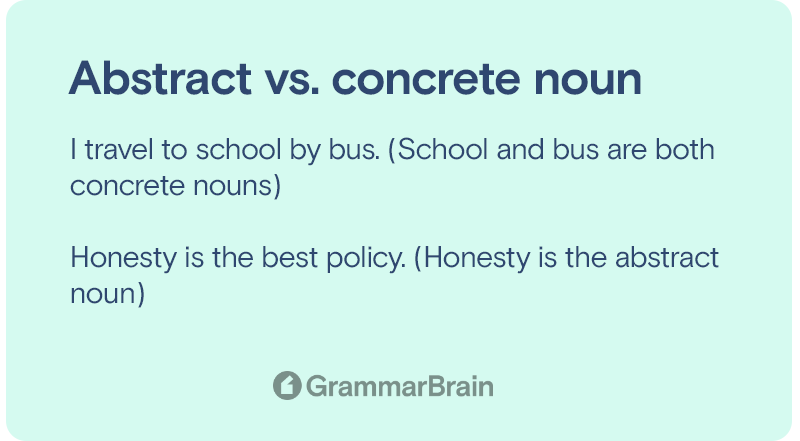
Abstract nouns in comparison to concrete nouns
Concrete noun, as the name suggests, includes all those objects which have a physical presence and are tangible. They can be perceived with the help of our five senses. These include nouns such as book, pen, cup, table silk, door, car, and so on.
- I travel to school by bus . (School and bus are both concrete nouns )
- Sally opened the door. (Door is the concrete noun)
Abstract nouns include everything that is intangible and cannot be perceived by the five senses. These include emotions, feelings, ideas, and more.
- Honesty is the best policy. (Honesty is the abstract noun)
- Freedom is my birthright. (Freedom is the abstract noun)
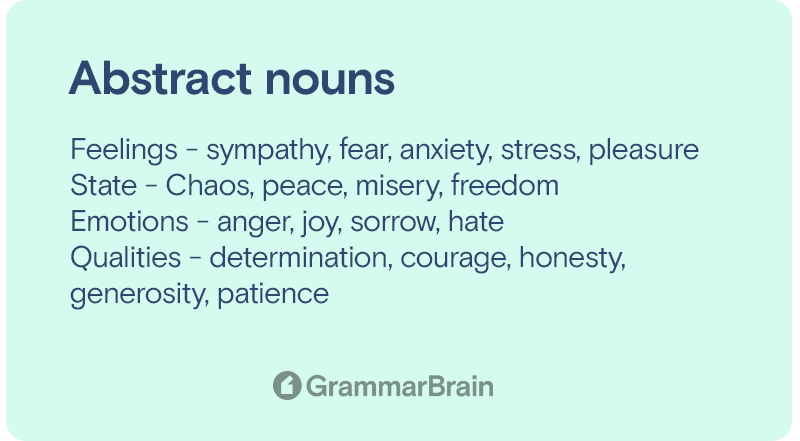
Abstract noun word list
Here are some examples of abstract nouns based on their kind.
- Feelings – sympathy, fear, anxiety, stress, pleasure
- State – Chaos, peace, misery, freedom
- Emotions – anger, joy, sorrow, hate
- Qualities – determination, courage, honesty, generosity, patience
- Concepts – democracy, charity, deceit, opportunity, comfort
- Moments – career, death, marriage, childhood, birth
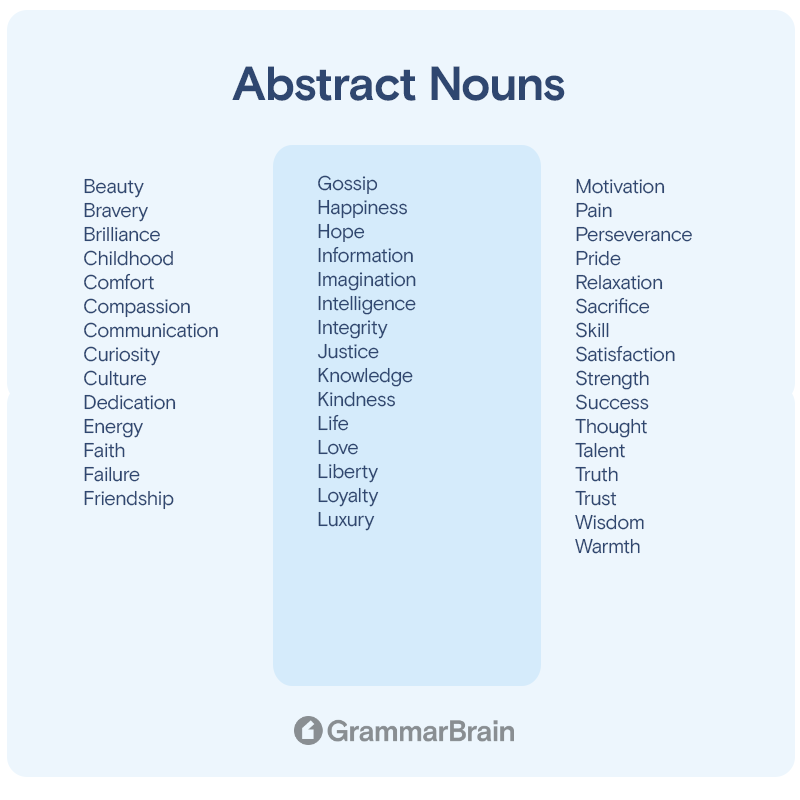
More examples of commonly used abstract nouns
- Bravery
- Brilliance
- Childhood
- Comfort
- Compassion
- Communication
- Curiosity
- Culture
- Dedication
- Energy
- Faith
- Friendship
- Gossip
- Information
- Imagination
- Intelligence
- Integrity
- Justice
- Knowledge
- Kindness
- Liberty
- Loyalty
- Luxury
- Motivation
- Perseverance
- Relaxation
- Skill
- Satisfaction
- Strength
- Success
- Thought
- Talent
- Truth
- Trust
- Wisdom
- Warmth
Sentence examples with abstract nouns
The following are three sentence examples with abstract nouns –
- This cafe has a pleasant ambiance. (Ambiance is the abstract noun)
- Pride is a deadly sin. (Pride is the abstract noun)
- My friendship with Peter is of seven years . (Friendship is the abstract noun)
Conversion of Verbs and Adjectives into Abstract Nouns
Convert verbs and adjectives into abstract nouns by adding a suffix . The reverse is also a possibility.
- Perceive – Perception
- Inform – Information
- Determine – Determination
- Dark – Darkness
- Silent – Silence
Why are abstract nouns important?
Abstract nouns are tricky. Use concrete nouns to make them understandable in sentences. Abstract nouns are not of much use from a business point of view.
However, they are an integral part of any English grammar course. Conversions between abstract nouns and verbs or adjectives are essential while learning complete sentence construction.
Yes, warmth is an abstract noun.
The abstract form of ability (abstract noun) is able.
Five examples of abstract nouns include honesty, glory, patience, determination, and truth.
Inside this article
Fact checked: Content is rigorously reviewed by a team of qualified and experienced fact checkers. Fact checkers review articles for factual accuracy, relevance, and timeliness. Learn more.

About the author
Dalia Y.: Dalia is an English Major and linguistics expert with an additional degree in Psychology. Dalia has featured articles on Forbes, Inc, Fast Company, Grammarly, and many more. She covers English, ESL, and all things grammar on GrammarBrain.
Core lessons
- Abstract Noun
- Accusative Case
- Active Sentence
- Alliteration
- Adjective Clause
- Adjective Phrase
- Adverbial Clause
- Appositive Phrase
- Body Paragraph
- Compound Adjective
- Complex Sentence
- Compound Words
- Compound Predicate
- Common Noun
- Comparative Adjective
- Comparative and Superlative
- Compound Noun
- Compound Subject
- Compound Sentence
- Copular Verb
- Collective Noun
- Colloquialism
- Conciseness
- Conditional
- Concrete Noun
- Conjunction
- Conjugation
- Conditional Sentence
- Comma Splice
- Correlative Conjunction
- Coordinating Conjunction
- Coordinate Adjective
- Cumulative Adjective
- Dative Case
- Declarative Statement
- Direct Object Pronoun
- Direct Object
- Dangling Modifier
- Demonstrative Pronoun
- Demonstrative Adjective
- Direct Characterization
- Definite Article
- Doublespeak
- Equivocation Fallacy
- Future Perfect Progressive
- Future Simple
- Future Perfect Continuous
- Future Perfect
- First Conditional
- Gerund Phrase
- Genitive Case
- Helping Verb
- Irregular Adjective
- Irregular Verb
- Imperative Sentence
- Indefinite Article
- Intransitive Verb
- Introductory Phrase
- Indefinite Pronoun
- Indirect Characterization
- Interrogative Sentence
- Intensive Pronoun
- Inanimate Object
- Indefinite Tense
- Infinitive Phrase
- Interjection
- Intensifier
- Indicative Mood
- Juxtaposition
- Linking Verb
- Misplaced Modifier
- Nominative Case
- Noun Adjective
- Object Pronoun
- Object Complement
- Order of Adjectives
- Parallelism
- Prepositional Phrase
- Past Simple Tense
- Past Continuous Tense
- Past Perfect Tense
- Past Progressive Tense
- Present Simple Tense
- Present Perfect Tense
- Personal Pronoun
- Personification
- Persuasive Writing
- Parallel Structure
- Phrasal Verb
- Predicate Adjective
- Predicate Nominative
- Phonetic Language
- Plural Noun
- Punctuation
- Punctuation Marks
- Preposition
- Preposition of Place
- Parts of Speech
- Possessive Adjective
- Possessive Determiner
- Possessive Case
- Possessive Noun
- Proper Adjective
- Proper Noun
- Present Participle
- Quotation Marks
- Relative Pronoun
- Reflexive Pronoun
- Reciprocal Pronoun
- Subordinating Conjunction
- Simple Future Tense
- Stative Verb
- Subjunctive
- Subject Complement
- Subject of a Sentence
- Sentence Variety
- Second Conditional
- Superlative Adjective
- Slash Symbol
- Topic Sentence
- Types of Nouns
- Types of Sentences
- Uncountable Noun
- Vowels and Consonants
Popular lessons

Stay awhile. Your weekly dose of grammar and English fun.

The world's best online resource for learning English. Understand words, phrases, slang terms, and all other variations of the English language.
- Abbreviations
- Editorial Policy

IMAGES
COMMENTS
Feb 25, 2023 · Abstract Noun | Definition, Examples & Worksheet. Published on February 25, 2023 by Jack Caulfield. Revised on April 18, 2023. An abstract noun is a noun that refers to something non-physical—something conceptual that you can’t perceive directly with your senses. Examples include “sadness,” “analysis,” “government,” and ...
Jul 9, 2014 · The parameters, which may help identify those, can be characterized as either extra linguistic or linguistic, with the latter ones falling into semantic or formal. Generally, all the parameters mentioned in earlier research on abstract nouns can be categorized into: 1. Extra linguistic 2.
Jul 1, 2014 · This research aims in extracting the complex sentences with abstract nouns for the sentiment classification from the twitter data. To extract the complex sentences, the proposed Complex Sentence ...
Apr 20, 2021 · Abstract nouns are all the things we can't actually see, hear, smell, taste, or touch. Find out how to identify and use abstract nouns.
Nov 28, 2013 · In this chapter we set out an account of abstract nouns which builds on and seeks to re-connect with these largely forgotten antecedents. The chapter proposes several semantic templates for abstract noun meanings, and illustrates them with explications for English words such as illness, trauma, violence, suicide, beauty, and temperature. The ...
An abstract noun is a word that refers to something intangible, such as an emotion (e.g., anger, hate), a feeling (e.g., anxiety, fear), a quality (e.g., courage, patience), or an idea. An abstract noun does not represent a physical object. It is the opposite of a concrete noun.
Oct 27, 2021 · Research on abstract nouns indicates that a useful criterion for identifying them, among all nouns, is based on their morphological features. In English, as observed. by Zamparelli (2020: ...
T h e A b s t r a c t N o u n Recognize an abstract noun when you see one. Poznan Studies in Contemporary Linguistics, 2008. The paper presents a study aiming at comparing the usefulness of the definitions of abstract nouns in a pedagogical dictionary (Oxford Advanced Learners Dictionary, OALD7) and a nativespeaker dictionary of English (The ew Oxford Dictionary of English, NODE).
Nov 8, 2022 · (Ambiance is the abstract noun) Pride is a deadly sin. (Pride is the abstract noun) My friendship with Peter is of seven years. (Friendship is the abstract noun) Conversion of Verbs and Adjectives into Abstract Nouns . Convert verbs and adjectives into abstract nouns by adding a suffix. The reverse is also a possibility. For example:
Ø How to recognize an Abstract Noun→. Some words can either be an abstract noun or can be verbs in a sentence. Thus, it is a bit tricky to recognize abstract nouns in a sentence. And it is important to distinguish between them in order apply correct grammatical rules. Let us look as some examples of some such words for better understanding ...